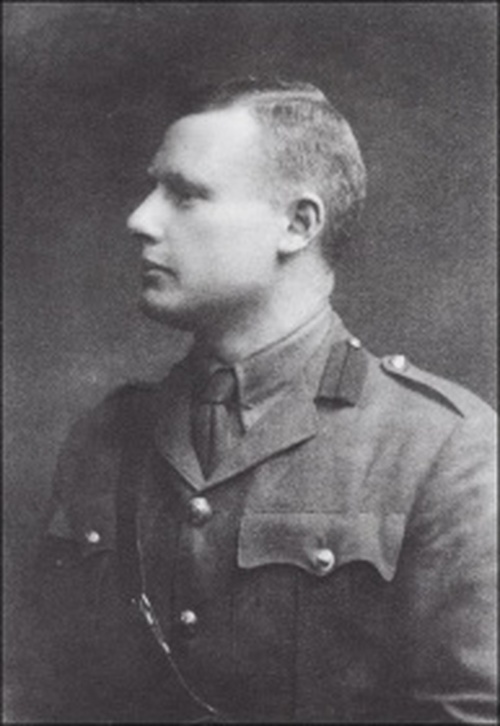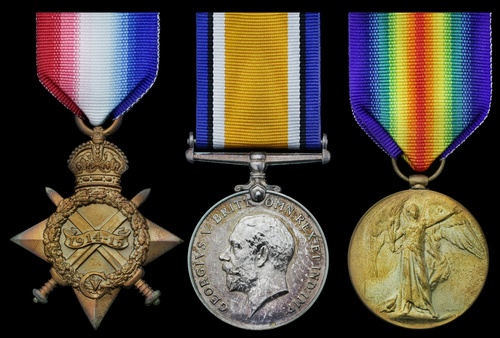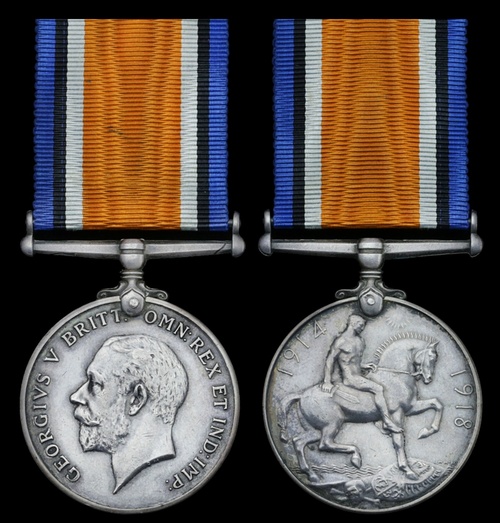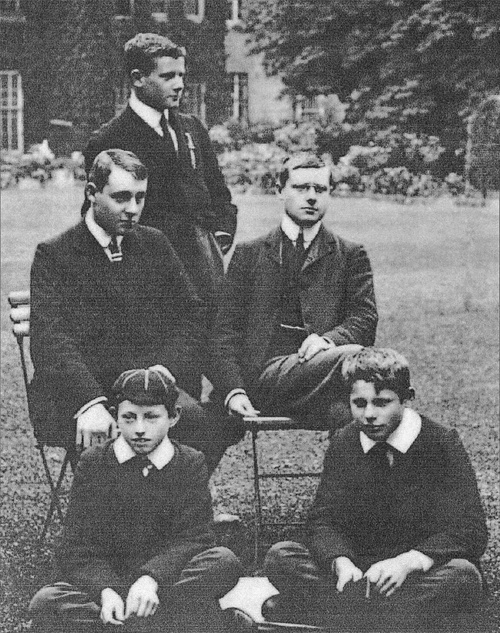Auction: 20001 - Orders, Decorations and Medals - conducted behind closed doors
Lot: 841
Family group:
'Tis midnight, and above the hollow trench,
Seen through a gaunt wood's battle-blasted trunks
And the stark rafters of a shattered grange,
The quiet sky hangs huge and thick with stars.
And through the vast gloom, murdering its peace,
Guns bellow and their shells rush swishing ere
They burst in death and thunder, or they fling
Wild jangling spirals round the screaming air.'
Extract from Walter Lyon's Lines Written in a Fire-Trench (1915).
The important and highly emotive 'War Poet's' 1914-15 trio to Captain W. S. S. Lyon, Royal Scots, whose haunting lines encapsulate the horrors of the Ypres Salient; killed in action at Potijze Wood on 8 May 1915, Lyon lives on through his war poetry
1914-15 Star (Lieut. W. S. S. Lyon. R.Scots.); British War and Victory Medals 1914-19 (Lieut. W. S. S. Lyon.), good very fine (3)
The poignant British War Medal to Lieutenant C. J. Lyon, Royal Scots Fusiliers, who was mentioned in dispatches and killed in action while leading his men in a gallant bayonet charge which re-captured Herenthage Château, near Ypres
British War Medal 1914-19 (Lieut. C. J. Lyon.), light scratches, very fine
Walter Scott Stuart Lyon was born in Scotland on 12 October 1886, the son of Walter and Isabella Lyon of Tantallon Lodge, North Berwick. Like his four brothers, Lyon was educated at Haileybury (Trevelyan). He appears alongside them in a 'Lyon' group photograph, taken in the quadrangle of Trevelyan House between 1905 and 1907 (illustrated). Of the five boys in the photograph, one (John, front row, left) tragically died at Haileybury, while three (Pat, standing, Charles, middle row, right and Walter, middle row, left) were to be killed in action during the Great War. Only Percy (front row, right) survived. Young Walter went up to Oxford in 1905, reading Classics at Balliol College. The Balliol College War Memorial Book says of him: 'In College he was extremely silent and reserved, and probably suffered a good deal from solitude: Oxford is sometimes unconsciously cruel to some of her sons.' Lyon wrote poems as a form of escapism, his mind wandering to the palaces and basilicas of Renaissance Italy. In 1909 he began professional training as a Scottish Advocate, graduating in law in 1912. He devoted his free time to The Edinburgh University Settlement, of which he became Sub-Warden.
Lyon commissioned as a 2nd Lieutenant with the 9th (Territorial) Battalion, Royal Scots in 1909 and rose to Lieutenant in 1912. When the Great War began he was appointed Staff Captain to the Lothian Brigade, overseeing Scotland's coastal defences. He then returned to the 9th Battalion, landing in France on 31 March 1915. By that time, his brothers Pat and Charles had already been killed. Pat, serving with the Gordon Highlanders, fell at Clary on 26 August 1914, just five days after the first British shots of the Great War had been fired. Charles, Adjutant of the 1st Battalion, Royal Scots Fusiliers, was killed while bravely leading in his men in a bayonet charge which saved the British position at Herenthage Château. Without this strong-point, Ypres may well have fallen. In the subsequent fighting, Charles's grave was destroyed, denying Walter the opportunity of seeing it. The 9th Battalion, Royal Scots arrived at trenches near 'Glencorse Wood' outside Ypres on 8 April 1915. This feature was named after the Royal Scots' barracks in Edinburgh. During this posting, Lyon wrote two poems entitled Easter at Ypres and Lines Written in a Fire Trench (quoted above). Easter at Ypres evokes the shattered Belgian city, conjuring an eerie scene not unlike the warn-ravaged township in Sam Mendes's film 1917:
'The sacred Head was bound and diapered,
The sacred Body wrapped in charnel shroud,
And hearts were breaking, hopes that towered were bowed,
And life died quite when died the living Word.
So lies this ruined city. She hath heard
The rush of foes brutal and strong and proud,
And felt their bolted fury. She is ploughed
With fire and steel, and all her grace is blurred.
But with the third sun rose the Light indeed,
Calm and victorious through with brows yet marred
By Hell's red flame so lately visited.
Nor less for thee, sweet city, better starred
Than this grim hour portends, new times succeed;
And thou shalt re-awake, though aye be scarred.'
The 9th Battalion took part in an attack north of St. Jean on 23 April, losing 4 officers and 120 other ranks killed and wounded. A few days later, while the Second Battle of Ypres was at its fiercest, Lyon wrote his third poem, On a Grave in a Trench. No longer able to disguise his bitterness towards the war, he inscribed this grave with the words: 'English killed for Patrie'. On 4 May, Lyon and the Royal Scots moved forward into dugouts in Potijze Wood near the Menin Road, just 200 yards from the firing line. It was then that he wrote his last and most haunting poem, I Tracked a Dead Man Down a Trench:
'I tracked a dead man down a trench,
I knew not he was dead.
They told me he had gone that way,
And there his foot-marks led.
The trench was long and close and curved,
It seemed without an end;
And as I threaded each new bay
I thought to see my friend.
At last I saw his back. He crouched
As still as still could be,
And when I called his name aloud
He did not answer me.
The floor-way of the trench was wet
Where he was crouching dead;
The water of the pool was brown,
And round him it was red.
I stole up softly where he stayed
With head hung down all slack,
And on his shoulders laid my hands
And drew him gently back.
And then, as I had guessed, I saw
His head, and how the crown -
I saw then why he crouched so still,
And why his head hung down.'
On 8 May, just hours after he penned these tragic lines, the 9th Battalion came under a fierce German bombardment which tore up trees by the roots. Lyon was among the dead, joining not only the 'friend' of his final poem, but also his brothers Pat and Charles. The altar rails inside Haileybury School Chapel were dedicated to the fallen Lyon boys.
Walter Lyon was reputedly the first member of the Scottish Bar to be killed in the Great War. A collection of his poems was published under the title Easter at Ypres in 1916, and two are included in an anthology of Public School War Poetry called A Deep Cry (1993). Lyon has no known grave, though his name appears on Panel 11 of the Menin Gate. It also appears on the Cloister Memorial at Haileybury, and in the Memorial Book of Balliol College, Oxford.
Sold with copied MIC, birth certificate, archival research, London Gazette entries, and a copy of Dan Lyon's article 'Some Great War Lyon Toffs and Toughs', O.M.R.S. Journal (June 2009) which describes the wartime services of Pat and Charles Lyon.
Charles James Lyon, younger brother of Walter Scott Stuart Lyon, was born on 28 March 1890. Educated at Haileybury (Trevelyan) from 1905 to 1908, he followed his older brother Pat into the Army, and was gazetted 2nd Lieutenant in the Royal Scots Fusiliers in 1909. He served with the Mounted Infantry in Harrismith, South Africa, rising to Lieutenant in 1911. Present at the Battle of the Aisne, he was mentioned in Sir John French's famous Dispatch (London Gazette, 30 October 1914). On 18 October, following heavy losses south of Herlies, he became acting Adjutant of the 1st Battalion. He went forward under heavy fire with the order for Captain Boyle's 'C' Company to retire from Herlies. After Boyle was killed, Lyon took command of 'C' Company and led it to successfully capture a German trench.
In November the 1st Battalion was positioned in the Ypres Salient, west of Geluveld. It held the vital Herenthage Château, which had a clear field of fire over enemy lines. The Germans managed to capture this strong-point on 14 November, but Lyon led a party of the Royal Scots Fusiliers in a daring counter-attack which evicted the Germans from the building. This example of bravery and initiative was to cost Lyon his life. Buried behind the British lines, his grave was destroyed by the subsequent German bombardment. He is commemorated on the Menin Gate Memorial, alongside his older brother Walter; sold with copied MIC.
Subject to 20% VAT on Buyer’s Premium. For more information please view Terms and Conditions for Buyers.
Sold for
£2,600
Starting price
£800











